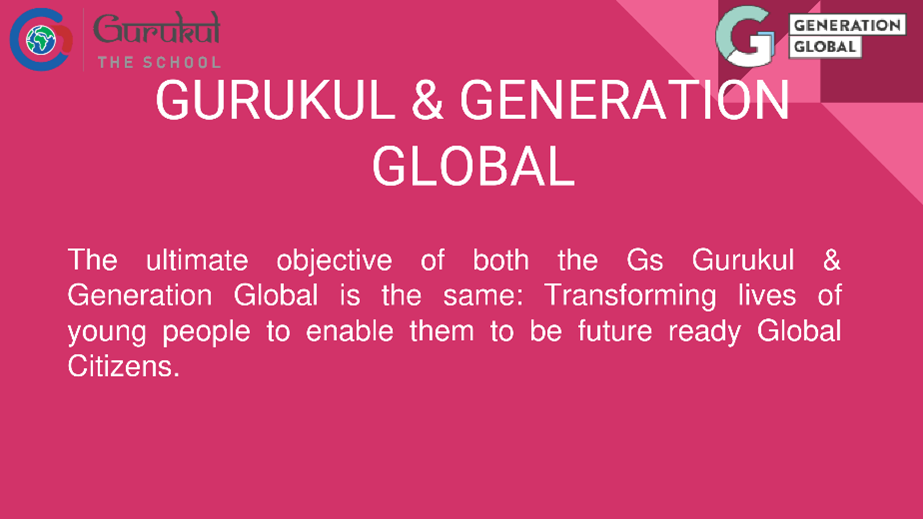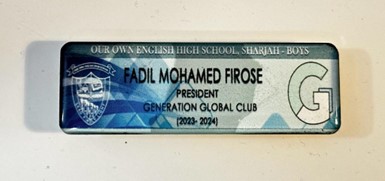Generation Global Clubs In Action
Engaging students beyond the classroom and curriculum is a key aspect of their holistic development. That’s where co-curricular activities, especially clubs and societies, come into play. Interestingly, schools worldwide are adopting the Generation Global programme as a dedicated club, contributing to a unique learning experience. Whether it’s a new school, an educator, or a long-time member of our community, the Generation Global programme integrates smoothly into the school’s co-curricular activities.
Having connected with school coordinators, educators, school leaders, and young minds through school visits, we have gathered insights into how these clubs operate. In this blog, we will share five best practices derived from our conversations to guide you if you are considering launching a Generation Global Club in your school or learning community.
Orientation 101 - Welcome all students aged 13-17
Kickstart the academic year with a comprehensive orientation, emphasising the significance of dialogue as a skill for life and work. This introductory session will help students understand how dialogue skills can help them learn about new perspectives from individuals who are different from them, create meaningful connections with peers from all over the world, and learn about the world and themselves.
For schools who have recently started incorporating the programme, the designated educator can lead the inaugural orientation, and for those well-acquainted with the programme, involvement of experienced students and alumni adds a unique touch.
Take a cue from Gurukul, the School-Ghaziabad, India, where a mass orientation involves alumni and educators presenting the programme’s impact through experience sharing and presentations. This sets the stage for motivated students to join the dialogue journey.
Meanwhile at, GEMS Modern Academy-Dubai, UAE and MTsN 1 Kota Malang, Indonesia, the educators and school leadership takes proactive steps to integrate parents and guardians in the process. At the start of each academic session, lead educators conduct an orientation for parents/guardians and students. These sessions go beyond the conventional, incorporating special zoom calls and messages. This approach ensures that parents not only understand the programme’s benefits but also have a direct channel to address any queries they might have.

Empower Student Leadership – Set up a student committee
Empower students by setting up a student team or committee comprising of a club President, Vice- President, and Secretary. GEMS Our Own English High School Boys- Sharjah, UAE runs an active club where every year the educator in-charge selects the student leadership team based on each student’s performance by gauging their level of participation in terms of the number of Video Conferences attended as well as the quality of their participation. To add a creative touch, the students even design unique badges for each member of the Generation Global club.
A school is free to adapt their own process to set up a student committee or team be it via elections, a selection process based on the students’ performance, a combination of both or any other system that best suits the school. Having a committee or team helps provide students ownership and enhances their leadership skills, creating a dynamic and engaged club environment.

Create a Structure for the club
The beauty of the Generation Global programme is that it can be customised to suite students’ and school’s needs. GEMS Cambridge International Private school-Sharjah, UAE is one school that has customised the programme to keep it interesting and engaging for students by creating a structure and staggering the topics for different age groups. For example: students aged 13-14 are introduced to topics such as Climate Change and Education, while students aged 16 and up are introduced to topics such as rights of women and girls. The designated educator introduces new topics every year to each age group. This approach not only sustains student interest but also allows them to gain expertise in each topic with focused attention on 2-3 topics annually.
The Millenium School-Dubai, UAE on the other hand, has a detailed action plan for their club that is created at the start of each academic year, highlighting each step from registering new students to conducting interclass dialogues to selecting the topics, video conferences, and events in Generation Global that the school and students will participate in. All these processes have a set deadline with an educator in charge to ensure they are completed on time. This is an excellent approach to ensure that the club works smoothly throughout the year.
Create events and initiatives around global topics
A Generation Global club is a great way for students to extend their learning beyond video conferences, applying their knowledge through meaningful actions. At Ved Vyasa DAV Public School- Delhi, India, students exemplify this approach by not only utilising their knowledge but also actively participating in additional initiatives to drive positive change in their community. For instance, each student involved in Generation Global takes part in activities such as the “Trash to Cash” drive. In this project, they collect trash from their neighbourhood, turning it into art that is then sold.
Similarly, Bal Bharati Public School Dwarka-Delhi, India provides a unique example with its dedicated Generation Global week. Every grade (primary to high school) chooses a topic and participates in a variety of events such as poster making competitions, debates, blogs, mock dialogues which are judged by alumni. Such an approach helps include students of all ages to learn about global issues and participate in the club in a creative offline environment. It further promotes interest about the programme among junior classes.
Leverage the resources to prepare students to dialogue
Whether it’s an after-school club or one that has a dedicated calendar slot for club-based activities within school hours, educators can utilise our downloadable resources to engage in activities that students can practice along with them to start offline dialogues with their peers and enhance their core skills —critical thinking, communication, active listening, questioning and reflection.
Schools such as Bal Bharati Public School Dwarka, India, GEMS Our Own English High School Boys and The Millennium School, UAE have successfully incorporated these resources into their curriculum. Each educator selects activities from these resources which they teach their students during their dedicated club/subject period or as an after-school activity. They often add sub-topics for their students to research on beforehand so they can facilitate dialogues, discussions or mock conferences with their peers during these dedicated hours. These mock conferences are also sometimes extended to junior classes for students aged 10 to 12.
GEMS Cambridge International, Sharjah, adopts a student- centred approach by allowing students to take the lead. The school supports active student ownership of their learning journey by enabling them to build their own study/activity plans using the resources. Their educator in charge discusses the offline resources with the students, and the students choose which activities they would like to perform in their dedicated time with their educator in charge. Based on their choices, the educator creates an agenda for their in-person sessions that includes these activities.
Moreover, the use of Generation Global’s video conferences in multiple languages, including Indonesian, Spanish, Ukrainian, Hindi, and Urdu, opens diverse avenues. MAN 2 Kota Padang and MAN 2 Ponorogo, Indonesia, leverage this multilingual feature by participating in Indonesian Video Conferences. This approach allows students to practice dialogue in their native language before seamlessly transitioning to English video conferences, building confidence and competence in the process.
Celebrate your students!
Celebrating success within the club or on the Generation Global platform keeps the enthusiasm alive in young learners. The Millenium school, UAE and GD Goenka Model Town-Delhi, India highlights the programme and includes student spotlights in their school newsletters, celebrating the positive influence of dialogues on their community. The Millenium school goes a step further with a dedicated bulletin board that highlights their club’s achievements.
Similarly, Gurukul the School in India and Labschool Kebayoran in Indonesia understand the significance of recognising student accomplishments. They incorporate a dynamic approach by showcasing their students’ achievements through presentations during orientations. An additional layer of acknowledgment comes in the form of “Labschool Stars” at Labschool Kebayoran, where student achievements are celebrated during school assemblies and other publications. Whether through newsletters, bulletin boards, or announcements, giving students credit for their contributions within the school fosters a sense of pride and motivation.
We hope the experiences of schools in our community will inspire you to start a Generation Global club at your school and create a space for your students to engage in meaningful dialogues.